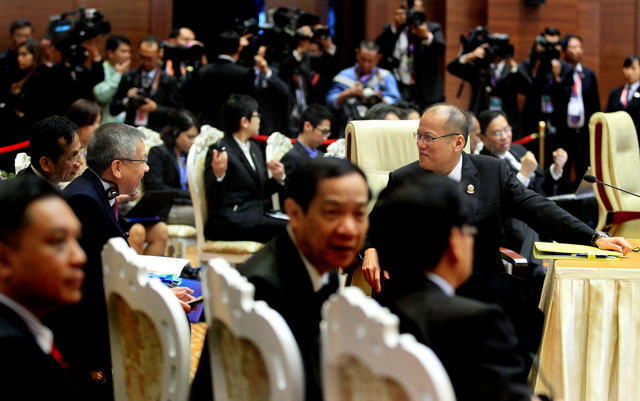SUMMARY
This is AI generated summarization, which may have errors. For context, always refer to the full article.

NAYPYIDAW, Myanmar – President Benigno Aquino III has said he would bring up recent acts of aggression by China against the Philippines in the West Philippine Sea (South China Sea) at the 25th ASEAN Summit, but after the plenary session here, there was no mention of specifics by Aquino.
On Wednesday, November 12, following the ASEAN Summit-Plenary Session, Communications Secretary Herminio Coloma told reporters “there was no detailed discussion” on developments over the disputed sea.
“The general sense of the heads of state was one of support,” he said. “They recognized this to be an important step forward in the work of ASEAN, and they acknowledged that peaceful resolution is essential especially in terms of pushing the agenda of regional economic integration and peace and stability in the region is an important precondition for attaining a greater measure of economic progress.”
Despite this, Coloma emphasized Aquino “did not shy away” from talking about China.
“If you use that word there’s an implication of being reluctant or reticent. There is no such thing,” he said.
Coloma said Aquino also noted his meeting with Chinese President Xi Jinping a day earlier, and said they “had a warm conversation on pursuing the peaceful path and continuing the agreements forged in the past between the Philippines and the Republic of China.” The President also encouraged other member states to “continue negotiations with China.”
But while Coloma acknowledged the meeting was a “positive development” between the two leaders, he gave assurances the case the Philippines filed against China stays.
“We continue to affirm that for our side, we will abide by the principles of peaceful settlement of disputes, we will never and will not take any aggressive action or resort to any move that will create tension,” he said.
“We continue to follow the norms of conduct that are defined by the peaceful settlement of disputes with regard to issues of maritime entitlements.”
It is Aquino’s first ASEAN Summit since the Philippines submitted a memorial to a United Nations-backed arbitral tribunal over a maritime dispute with China. The memorial, a nearly 4,000-page document, was submitted by the Philippines on March 29 in a bid to end what it considered decades of bullying by China. China however has refused to acknowledge the designated arbitral tribunal’s jurisdiction to hear the case.
Other ASEAN countries like Malaysia, Vietnam and Brunei are also claimants in the disputed area.
Excited about integration
Coloma emphasized that there was affirmation from the member states on “the fleshing out of the Declaration of the Code of Conduct” adding, a “definitive code of conduct was generally seen as an element of regional peace and stability.”
The document is yet to be completed after over 10 years of discussions. He said this is “the gist of what [the Philippines] is seeking.”
Coloma however refused to say China was the main point of discussion at the plenary, saying it was the ASEAN Economic Community in 2015 that appeared to be the most widely discussed.
“They were all looking forward to ASEAN Economic Community, they were all focusing on the significance of ASEAN Community building efforts, they all expressed importance of having unity as a prerequisite to achieving ASEAN centrality,” he said.
Other topics that were discussed included the threat of the Islamic State of Iraq and Syria (ISIS), which all agreed was a “significant issue that needed to be addressed,” as well as the threat of Ebola. On Ebola, Coloma said there was “broad agreement that there has to be some type of regional effort to meet this threat.”
Additional concerns brought up by Aquino included increased development of trade and investment, accelerated infrastructure for greater connectivity, the need to enhance protection of rights of migrant workers, disaster risk reduction and management, and the necessity of unified action of regional air traffic management to promote connectivity. – Rappler.com
Add a comment
How does this make you feel?
There are no comments yet. Add your comment to start the conversation.